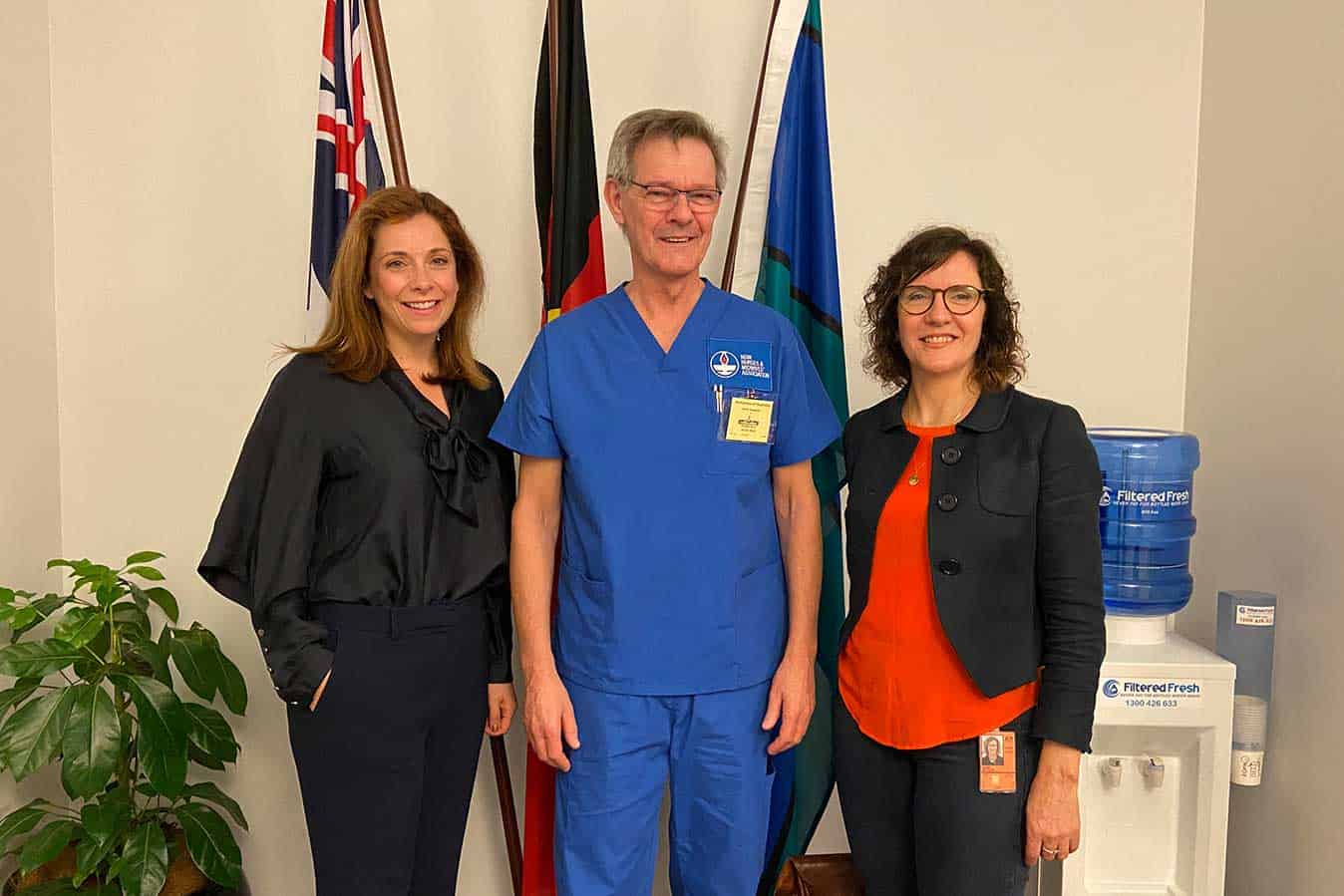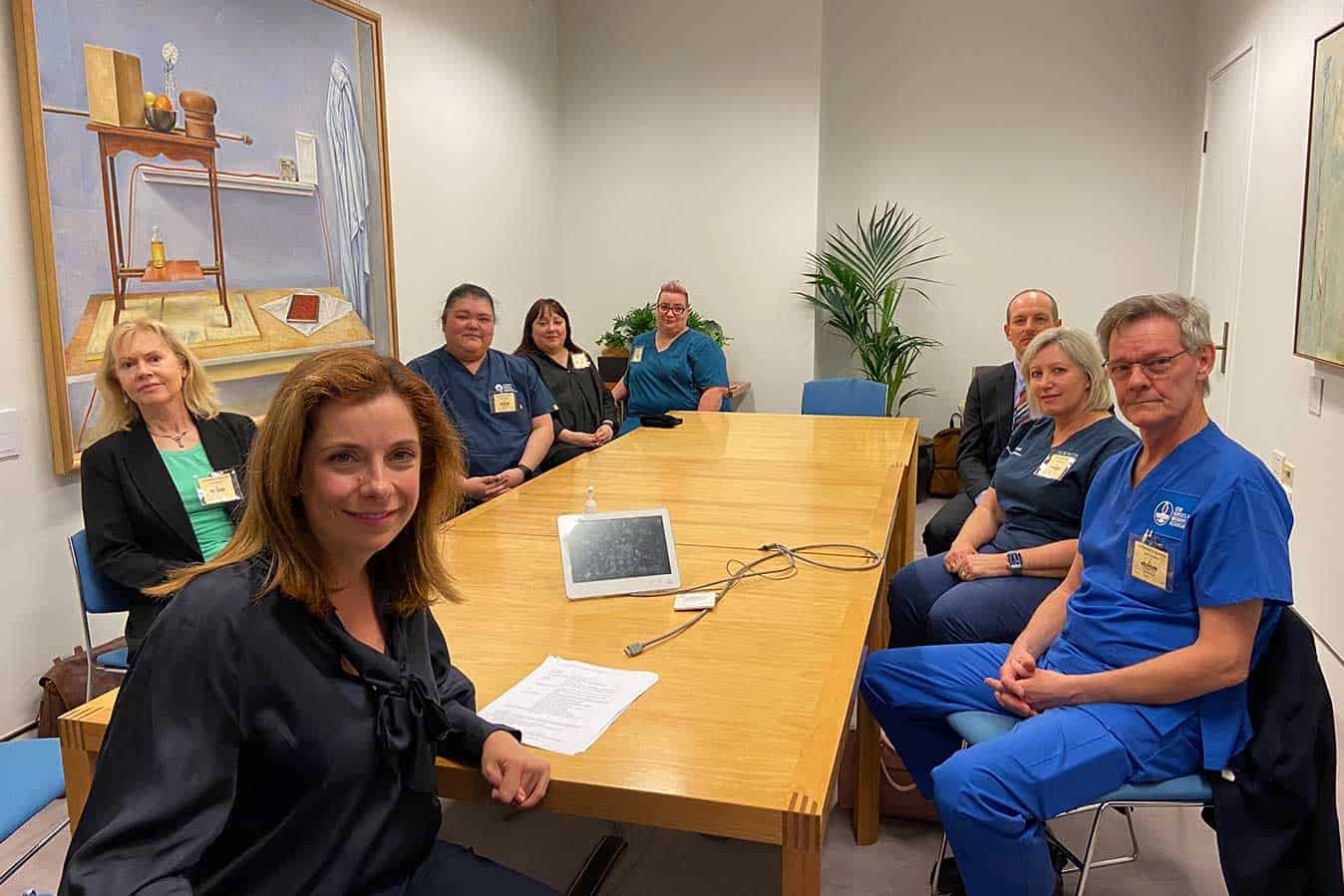Aged care homes will be required to have a registered nurse on duty 24/7, and make sure residents receive a minimum amount of care each day, after landmark legislation to reform the sector passed the Senate earlier this morning.
With the new Labor government handing down its first budget on Tuesday night, and a raft of legislation being considered this week in Parliament, the Australian Nursing and Midwifery Federation (ANMF) and a delegation of nurses from NSW, the ACT and South Australia converged on Canberra to lobby key politicians.
Speaking to the ANMJ at Parliament House, Palliative Care Nurse Practitioner Juliane Samara, who works across 29 aged care facilities throughout the ACT, described the passing of the Aged Care Legislation Amendment (Implementing Care Reform) Bill 2022, which now forces aged care homes to provide around-the-clock nursing care from July 2023, as a significant step towards long overdue progress to fix the sector.

“I think it’s vital,” said Juliane.
“People don’t stop dying and getting sick just because the roster finishes at 10 o’clock at night. They [residents] deserve and need registered nurses to be there to assess, treat and manage whatever symptoms they’ve got, around-the-clock.”
In her role providing care for residents who are dying, Juliane says having a registered nurse 24/7 means she can implement a plan to reduce their pain and suffering with the reassurance that staff with the right skills will be able to administer medicines as needed. However, that’s not the case at facilities that don’t have an RN, where residents and families often deal with unnecessary pain and distress while waiting for a registered nurse to arrive, she revealed.
Other measures under the reforms, crafted to “give older Australians the dignity and respect they deserve”, include ensuring aged care providers are transparent and accountable over their use of taxpayer funding through the publication of regular financial and operational reporting.
Glen O’Driscoll, an aged care nurse working in county NSW, said the reforms offered hope to the embattled sector.
“RN 24/7 will allow a range of facilities that function through a loophole in the system at the moment without an RN 24/7 to deliver a higher, safer, quality of care,” he said
Having worked at almost a dozen aged care facilities across the state this year, for multiple providers, including as part of a COVID-19 response team, Glen believes the core issue remained the same: understaffing.
“Everywhere I went, staff shortages were crucial,” he recalled.
“Not because of COVID, they were already crucial. In rural areas right now, they can’t attract staff. There’s no rental accommodation, so even if they do attract staff, they usually have to pay a premium for accommodation, if they can find it, which on their salaries, means they can’t make ends meet.
“It provides a big disincentive for people to enter the sector and it provides a big incentive for them to leave. That’s what’s happening.”
In Canberra, the delegation of ANMF members, which included registered nurses, nurse practitioners and advanced practice nurses working across a range of settings, met with Aged Care Minister Anika Wells, Health and Aged Care Minister Mark Butler, Assistant Health and Aged Care Minister and former ANMF Federal Secretary Ged Kearney, Independent Senator David Pocock, and Greens Senator Janet Rice.

In discussions with Minister Wells yesterday, aged care nurses shared their first-hand insights regarding issues and opportunities within the sector, including how the workforce can work together with the government to help it deliver on its commitments to improve care for older Australians.
Glen told Minister Wells the aged care workforce is tired and burnt-out, with the COVID-19 pandemic only adding to decades-long system shortcomings.
Unable to figure out how he could afford to raise a family and pay a mortgage, Glen left nursing as a young man, and shifted into IT. As his family grew up, he returned to the profession he loves, and aged care, to “make a difference”.
“Our workforce are tired. They feel undervalued, underappreciated, and they can’t make ends meet like any normal working person can. They’re looking for change on the floor and they’re very hopeful that this government will provide it.”
Glen said staff numbers, and RN oversight, were crucial to achieve aged care reform. Yet, he suggested some aged care providers had already looked at making adjustments to their staffing models in a bid to combat the incoming changes.
“Numbers on the floor is what it boils down to in residential aged care. If you don’t have enough workers, you don’t get the quality of service. You don’t avoid the falls. You don’t avoid the adverse outcomes.”

NSW aged care registered nurse Stephanie Sullivan has worked in the sector for nearly two decades. She has not received a pay rise in a couple of years and says aged care workers need to be paid more if retention, and recruitment of a new generation of staff, is to be improved.
The federal government has committed to funding any pay increase soon-to-be handed down by the Fair Work Commission in the current Aged Care Work Value case. The ANMF is seeking an across-the-board 25% pay increase for aged care employees, which is likely to cost tens of millions of dollars.
“Where I work, we’re always short-staffed,” Stephanie told Minister Wells.
“AINs are paid less than Coles workers and have a lot more responsibility: $25 an hour, it’s very hard, they have to work double shifts, overtime, just to make ends meet. People are leaving, they’re burnt-out.”
For many years, the ANMF and its state and territory branches have campaigned for RN 24/7 at every Australian nursing home to provide, or direct the provision of, care.
ANMF Federal Secretary Annie Butler said the union welcomed the opportunity to help the government implement the new reforms, adding that there were even further opportunities to improve the sector, such as the increased implementation of Nurse Practitioner led models in aged care.

Stephanie said a nurse practitioner on deck would be a welcome addition at the facility she works at.
“It’s so hard to contact a GP after hours and on weekends. If someone becomes palliative and needs palliative medications ordered, and we’re desperate, sometimes we need to send them to hospital, to ED, and that’s really not the best outcome.”
In the ACT, Juliane co-led a new model of care, Palliative Care Needs Rounds, to make a difference to older people at end of life. NPs went in and educated staff, including RNs and carers, to help identify residents who were deteriorating and likely to die within the next three to six months. Over 12 months, the program helped save $1.5 million in avoidable hospital admissions.
Juliane said getting more nurse practitioners into aged care, working to their full scope and collaboratively as part of multi-disciplinary teams, could make a massive difference.
“It’s thinking about the future and looking ahead and liaising with the staff in the facilities so that everybody’s got the confidence and the skills to do what they need to do for the residents, who are the sickest people in the country.”
Outdated funding models, however, remain one of the biggest barriers to increasing the number of NPs in aged care, she argued.
“If I went in as a private nurse practitioner, with the current MBS rebates, there’s no way I could make enough money to earn a wage in residential aged care.”
On Tuesday night, Labor’s 2022-23 Budget delivered a $3.9 billion package of reforms to fix the sector, including implementing many of the Aged Care Royal Commission’s recommendations such as mandated minimum care staffing minutes, a national registration scheme for personal care workers, and a dedicated Aged Care Complaints Commissioner.
Responding to ANMF nurses in Canberra, Minister Wells said she had previously worked in aged care and acutely understood the “coalface realities” facing the sector.
“Know that I do see you and I genuinely take efforts to understand what your lives and work shifts look like. I will keep doing that and please keep working with your union on fighting the good fight to get the reforms through as best as possible.”
In a statement today, following the passing of the aged care reform legislation, Minister Wells said the changes delivered on Labor’s commitment to put nurses back into nursing homes.
“This legislation demonstrates our commitment to making public what aged care providers are spending their money on, ensuring a fair and transparent system for our older Australians, their families and carers” she said.
“24/7 registered nurses in residential aged care is a significant change to ensure high quality care for older Australians.”
Juliane, who has spoken to politicians before and been fortunate enough to be at the policy table, considers yesterday’s meetings with ministers the first time she has felt truly listened to, and that real change is possible.
“There’s so much work to do in aged care,” she said.
“It’s hard to know where to start but finally we are getting some progress. I felt positive that she [Anika Wells] understood the issues, I felt positive that her government is actually starting to implement some reform. I’m hopeful that it will be a continuing process and that it won’t just stop when we get a wage rise and nurses 24/7; I’m hopeful that there’ll be a continuous reform approach.”









One Response
Sadly, ENs and allied health are NOT included in mandated care minutes, or count towards quality standards. Not having ENs and allied health places more pressure on already overworked RNs to manage more pain relief meds, pressure injuries, contractures, prescribe equipment etc without the support of these staff. We have a petition calling for mandated allied health and ENs being lodged at the senate next week. Pls sign at http://www.bringbacknursesandphysios.com.au